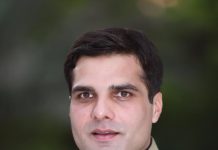An extensive report evaluating the social media companies’ attitude toward the Kashmiri struggle for freedom in the Indian Illegally Occupied Jammu & Kashmir has painted a grim picture of these giants’ “reprehensible” bias toward the freedom movement.
A report by a Kashmiri diaspora group Stand With Kashmir (SWK) has accused social media giants Twitter, Facebook, and Instagram of silencing Kashmiri voices on the digital platforms. The report accuses these companies of frequenting suspending the accounts of artists, academics, and journalists based in and outside the disputed region.
The 30-page report is titled “How social media corporations enable silence on Kashmir”. The report claims that since 2017, Facebook, Twitter, Instagram and other social media platforms have continually censored Kashmir-related content.
The report said that in an online poll conducted by SWK, 62 per cent of respondents said that they had experienced some kind of censorship on the three platforms of Facebook, Twitter and Instagram.
The report said, “Corporations are siding with India’s suppression of Kashmiri digital rights, including the government’s blockade of internet and telecommunications access in the region, as well as its weaponisation of the law and policy to curb the expression of Kashmiri political aspirations in the digital space.”
Social media giants ignoring censorship
The group’s research took about six months that included surveys and interviews with people based in and outside the Indian Illegally Occupied territory. The research found that Twitter, Facebook, and Instagram are censoring and crippling their online spaces of expression. The group called on the social media firms to fulfil their stated human rights obligations to people and provide transparency about the removal of content.
The report said, “… users’ accounts were disabled, suspended and permanently deleted. Users reported their account privileges were restricted or account content was removed. Users also say platforms offered dishonest technical reasons for the censorship of their accounts.”
The report said that the majority of Kashmiri users accuse these platforms of not addressing the censorship issues in an effective and timely manner.
‘Restricting social media reach’
The report has quoted Mir Suhail, a Kashmiri artist based in New York who has about 50,000 followers on Instagram. Suhail has accused social media corporations of restricting his social media reach.
Suhail said, “In early 2020, on an almost daily basis, I started getting notifications that my Instagram posts were being removed for hate speech or symbols. The same thing was happening on Twitter. I was drawing on different subjects related to the experiences of marginalised communities in India about the experiences of Indian Muslims, the new citizenship laws and on Kashmir.”
“To this day, there is a sensitivity filter on my Twitter account for each and everything I post, even if it is something entirely unremarkable. I share my work on these platforms and in doing so trust them to be ethical in how they handle it,” Suhail added.
The SWK spokesperson said that “since August 2019, the level of censorship of Kashmiri voices in person but also on social media has only increased. Kashmiris already have no avenues to express themselves in person. Social media provided an outlet for them.”
The spokesperson said, “Not only is the Indian government going after Kashmiri social media users in Kashmir, but social media companies are also complicit in censoring Kashmiris by removing content, blocking important accounts that provide information, and restricting the reach of content. This is unacceptable.”
Censorship after India scrapped Kashmir’s special status
The Indian fascist government scrapped Kashmir’s semi-autonomous status in August 2019. A sweeping communication and internet shutdown in the region followed the illegal move. The shutdown lasted for months. Access Now – an independent international advocacy organization that tracks internet access across the world – said that it was the longest internet suspension that took place in a democracy.
Earlier last year, the advocacy group’s report exposed India as the worst country that imposed internet shutdowns among the 129 countries. The report said that 109 of a total 155 internet shutdowns took place in the country led by India’s Prime Minister Narendra Modi of the ruling Bharatiya Janta Party.
Just two months after Kashmir’s crippling digital and military lockdown began, the global media watchdog Committee to Protect Journalists (CPJ) revealed in its report that “hundreds of thousands of tweets blocked in India since August 2017” had focused on Kashmir.
The report said that an overwhelming majority of the suspended accounts were from the group that referenced Kashmir, hosting over 920,000 tweets between them.
At the time, a Twitter transparency report also said that more accounts were withheld in India in the second half of 2018 than in the rest of the world combined.
‘Difficult to say if companies are accessory to censorship’
Digital rights activists from around the globe have also expressed their concerns over “the arbitrary removal of the online content” by social media platforms.
Krishnesh Bapat is a lawyer and fellow with the New Delhi-based rights group Internet Freedom Foundation. Bapat said, “There is a general lack of transparency whenever the social media content is taken down. The content is taken down arbitrarily and it is also restored arbitrarily. It is very difficult to gauge if they are doing it on the behest of someone else or themselves.”
The co-founder of Free Speech Collective Geeta Seshu said, “Successive governments have censored and silenced voices of dissent in Kashmir for decades now but when social media companies do so too, it becomes all the more reprehensible.”
Mumbai-based Seshu said, “Companies like Twitter and Facebook are platforms for people to speak out and make themselves heard, not just to those in power but also to one another. If these social media companies succumb to pressure from the government to silence or fail to push back on take-down requests, they do their users a huge disservice.”
She said that the censorship also “flies in the face of the avowed principles of these companies to provide safe spaces for conversations”.
Twitter’s response to SWK’s report
Addressing the allegations in a statement, a Twitter spokesperson said, “Twitter’s reporting processes are designed to be transparent and to enable real accountability.”
The spokesperson said, “Where possible, we provide user notice when we receive these requests. Importantly, unless we are prohibited from doing so, when we remove or withhold content in a certain country, Twitter will provide a copy of the request to the publicly available Lumen Database. When content is withheld, it is only withheld in the country making the removal demand and remains visible in all other jurisdictions.”
Facebook and Instagram are yet to comment on the report.
Curbing expression – The new rule
In recent years, the Kashmiris have extensively turned to social media to express their opinions in the long-disputed region. However, the New Delhi-planted regional government has frequently resorted to internet shutdowns saying that the social media platforms are being used to incite protests. In recent years and especially since the August 2019 move, the regional authorities have booked, summoned, and questioned many users over their social media content.
Just last year, two Kashmiri journalists Masarat Zahra and Gowhar Geelani were booked under the anti-terror law for their social media posts. The police claimed their posts were “prejudicial to the national integrity, sovereignty and security of India”.
Fascist Hindutva Ideology – The real inspiration
Earlier this year, the Indian government – which takes inspiration from the fascist Hindutva Ideology –introduced strict rules to regulate content on its social media. The new rules legally bind social media companies to remove posts and share information on the origin of content at the request of the government.
The new set of guidelines is called the Intermediary Guidelines and Digital Media Ethics Code. The introduction of new rules has sparked an uproar among digital rights activists regarding the status of freedom of speech in the country.









